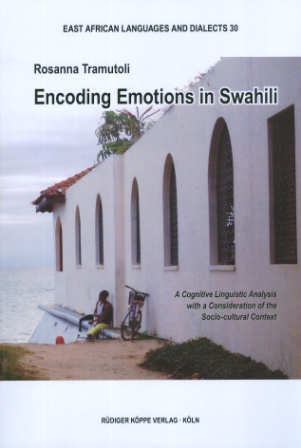
Encoding Emotions in Swahili
A Cognitive Linguistic Analysis with a Consideration of the Socio-cultural Context
Author: Rosanna Tramutoli. Series edited by: Bernd Heine, Wilhelm J.G. Möhlig †.
Series: EALD East African Languages and Dialects Volume 30
20208 pp. Roman, 176 pp.
5 colour screenshots, 1 facsimile reproduction
Text language(s): English
Format: 170 x 240 mm
400 g
Paperback
€ 59.80
Buy 'Encoding Emotions in Swahili' as a downloadable PDF document directly from our online shop »
Order 'Encoding Emotions in Swahili' as print edition »
The main goal of this research is to explore the linguistic forms that Swahili uses to encode emotional concepts (such as love and anger) in order to reflect on the implications of the correlation between the linguistic expression and the conceptualization of emotions.
The research investigates fundamental questions like, how does Swahili language codify complex notions of human feelings through its spectrum of emotion words and metaphorical expressions. Is the cognitive universal model enough to account for a description of context-specific emotional metaphors in Swahili? What makes Swahili literary metaphorical expressions different from the more conventional ones used in everyday speech? Why does Swahili use different experiential constructions (like nimekasirika – nina hasira – hasira imenipanda, ‘I am angry/ I feel angry’), if they all refer to a similar emotional concept (like ‘X being angry’)? Do these expressions really mean the same or is there any reason which motivates the choice of a specific strategy? Can we trace the cultural relevance of some specific metaphors of emotions?
Whereas most studies of the codification of emotions have focused on a single specific aspect (experiential constructions, lexicon, metaphors, etc.), this study seeks to give a broader picture of Swahili emotional expressions, considering different linguistic aspects, speakers’ folk definitions of emotional concepts, and ethnographic sources on body practices.
After introducing the reader to the main issues discussed in previous studies on the conceptualization of emotions, with particular focus on research on African languages (Chapter 1), the study shows how complex notions of human feelings (such as love and anger) are codified in the Swahili lexicon (Chapter 2). It analyses Swahili metaphorical expressions of emotion by comparing Swahili metaphors to the cognitive universal model and showing the flaws of Lakoff and Johnson’s analysis (Chapter 3). Expressions of emotion are also analyzed from a syntactic point of view, in order to explore the role of the participants involved in the emotional situation, by comparing Swahili experiential constructions to models in other African languages (Chapter 4). Finally, we highlight the link between some emotional linguistic expressions and the Swahili cultural context, by questioning the idea that these are to be considered as ‘metaphorical’ from an emic perspective, since they are part of the speakers’ reality (Chapter 5).
Under these links you will find further publications focusing on linguistic codes / conceptualization and the grammar of Swahili in general:
Accompanying material:
- Comparing African Spaces
(ISBN 978-3-89645-013-5 ) - Konzeptualisierung von Landschaft
im Mbukushu (K.333/K.43) Bantusprache in Nord-Namibia)
(ISBN 978-3-89645-600-7 ) - Language, Identity, and Conceptualization among the Khoisan
(ISBN 978-3-89645-143-9 ) - Perception of the Invisible
(ISBN 978-3-89645-603-8 ) - Swahili-Handbuch
(ISBN 978-3-927620-06-3 ) - The Bantu Languages of the Kenya Coast
(ISBN 978-3-89645-716-5 )
Cross-reference:
- Anthropologie des Raumes
(ISBN 978-3-89645-217-7 ) - Encoding Motion – Case Studies from Africa
(ISBN 978-3-89645-505-5 ) - Motion in Datooga
(ISBN 978-3-89645-668-7 ) - Räumliche Orientierung in nilotischen Sprachen
(ISBN 978-3-89645-661-8 )
| « back | Print version | [top] |
 Books
Books Audio
Audio Biographies
Biographies Series
Series Festschrifts
Festschrifts Journals
Journals